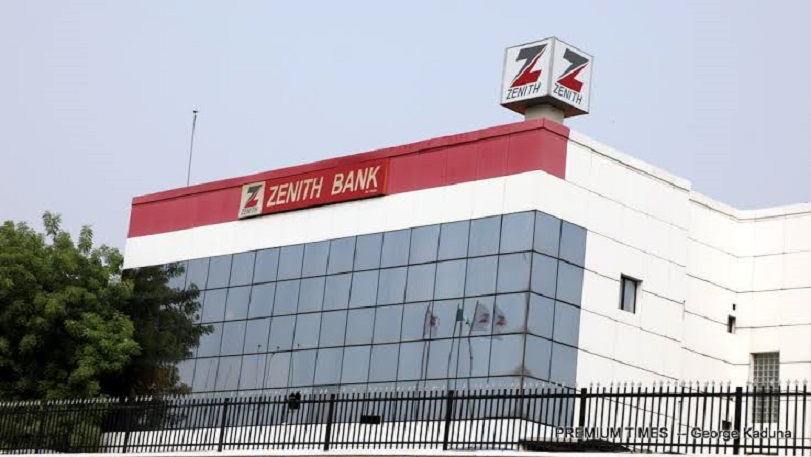Banking
9 Banks Battle Drop in Interest Income as FG Restructure Debt Portfolio

By Modupe Gbadeyanka
At least nine banks operating in the country are battling with the risk of N300 billion decline in their interest income in the 2018 financial year, due to declining yield on government securities.
The banks are Stanbic IBTC, Fidelity Bank, Guaranty Trust Bank (GTBank), Access Bank, Zenith Bank, UBA, FBN Holdings (FBNH), Diamond Bank and FCMB.
Following the decision of the federal government to restructure its debt portfolio, by replacing domestic loan with foreign loan, the Central Bank of Nigeria (CBN) commenced a gradual reduction in yields on treasury bills.
Financial Vanguard analysis revealed that yield on 182 days treasury bills (TBs) for example declined from 17 percent in January 2017 to 13.65 percent January this year, representing decline of 330 basis points (bps).
With this trend expected to continue this year, this will translate to sharp decline in interest income for banks, while the banks frantically adjust their treasury positions as well as re-pricing their instruments.
On the average, the nine banks have 14.6 percent of their interest bearing assets in government securities.
Stanbic IBTC has the highest concentration of government securities as percentage of total interest bearing assets. The bank has 36.6 percent of its interest bearing assets in government securities, followed by GTB with 18.3 percent, FBN Holdings with 16.7 percent, UBA with 14.5 percent, and Zenith Bank with 14.4 percent.
Diamond Bank has the lowest concentration of 5.8 percent followed by FCMB with 6.3 percent, Access Bank with 8.4 percent and Fidelity Bank with 10.6 percent.
While analysts were of the view that this exposes the banks to risk of decline in net interest income as yields on government securities continue to trend downwards, the banks however pointed to other factors that will help mitigate the risk to their interest income.
Impacts
Clement Adewuyi, an analyst with CadinalStone Partners, a Lagos based investment house, said that the nine banks will suffer decline in interest income ranging from 7.8 percent to 29.6 percent of their interest income in the 2018 operating year.
In a report titled: “Declining interest rate to weigh heavily on bank’s interest revenue”, he projected that Stanbic IBTC would suffer the largest decline of 29.6 percent in interest income, followed by Fidelity Bank with 27.1 percent and GTB with 22.5 percent.
Others are Access Bank with 19.7 percent projected decline, Zenith Bank with 14.8 percent, Diamond Bank with 13.7 percent, UBA with 10.5 percent, FBNH with 9.8 percent and FCMB with 7.8 percent.
Based on the nine months unaudited results of the banks for the period ending September 2017, the above portfolios imply decline in interest income of N27 billion for Stanbic IBTC, N30 billion for Fidelity Bank, N55.8 billion for GTB, N48 billion for Access Bank and N54 billion for Zenith Bank.
This also implies decline of interest income of N18 for Diamond Bank, N15 billion for UBA, N35 billion for FBNH and N7.5 billion for FCMB.
‘The above results to a N300.3 billion decline in the interest income of the nine banks which stood at N1.87 trillion for the nine months ended September 30th2017.
Adewuyi further projected that the nine banks, on the average, will suffer 15 percent decline in net interest income, translating to N176 billion decline in the net interest income of the nine banks, which stood at N1.76 trillion, as at September 2017.”
Further speaking to Financial Vanguard, Adewuyi said: “We expect the lower interest income regime to impact interest income, interest expense, trading income and derivative gains.
“Overall, we see net interest income (NII) across our coverage banks moderating by 15 percent. We think the degree of impact that will be felt in 2018 will be highly correlated with the duration of individual banks treasury security portfolio, the sensitivity of their asset yield to interest rate as well as the willingness and ability to grow the loan book.
“In addition, we also believe the positive economic outlook makes case for better asset quality as well as lower impairment provisions in 2018.
“Thus, we expect some of the impact of the expected lower interest income on profitability to be moderated by lower impairment charges as well as provision write-backs.”
Adewuyi’s projection is supported by Fitch Ratings, which warned that Nigerian banks will struggle to sustain the same level of profitability in 2018 due to reduction in government borrowing through treasury bills and declining yields.
“We expect falling T-Bill yields and lower issuance to put pressure on Nigerian banks’ profitability in 2018,” the global rating agency said in January.
Head, Investment Research, Afrinvest Limited, Mr Robert Omotunde, however disagree with Adewuyi’s position, saying the impact of declining yield on banks’ interest income will not be significant.
He stated: “While interest income is moderating, interest expense will moderate as well. We have projected the net interest margin (NIM) for tier-1 banks in 2018 to stand at 6.5 percent.
“Resultantly, the impact of the 4-5 percent decline in the interest rate on treasury securities will only reduce NIM by 20-50 basis points, leaving NIM at a minimum of 6 percent.
“This is not to say that the moderating yield environment will have no impact, the impact will however not be significant.
“Also, for banks with operations in Nigeria as well as in other African countries, the impact of the moderating yield on their consolidated net- interest income margin will not be enormous.
“Banks typically keep most of their assets as loans. Examining the banks’ 9 months financial statement, the bank with the highest portion of its interest bearing assets invested in treasury securities is Stanbic IBTC.
“In addition, so far, we have not seen that much response in interest rates on loans. The declining yield on treasury investments may not necessarily even reduce interest income, because, banks will rationally deploy their remaining assets to other investment opportunities.
“The banks’ prime lending rate is about 18 percent and prime lending accounts for 70-80 percent of interest yielding assets. The critical factor here is the banks’ ability to identify good credit.”
Supporting Omotunde’s position, Mr Olalekan Olabode, Head, Research Division, Vetiva Capital Management Limited, said the impact will be marginal.
Speaking to Financial Vanguard, he stated: “I do not think that declining interest rate is a big issue for banks. As interest rate moderates, the cost of their debt and deposits also reduces which in turn reduces interest expense. We believe banks need to de-risk their credit portfolio and focus loan growth on diversified and less risky sectors.
“Also, the economy needs to be de-risked. Banks have a problem extending credit because of the risk of default. The BVN, credit bureau, and collateral registry initiatives are a few steps in the right direction to support credit.
“Yes, the lower interest rate on treasury securities will impact banks’ interest income given that over 25 percent of assets of banks within our coverage is invested in treasury securities.
“That said, whilst the banks suffer from the impact of lower interest rate on interest income, we expect them to benefit on the non-interest income.
“As interest rate reduces, the value of their fixed income securities increase. This therefore leads to mark-to-market gains and supports earnings. Hence, the impact is marginal.”
Banks’ Reactions
In its response to Financial Vanguard, GTB maintained that the decline in interest rate was generally anticipated and that the bank plans to grow its loan book in order to mitigate the impact.
“The bank has a healthy portfolio of quality loans in excess of our fixed income security holdings. With the pickup in economic activities, the bank projects a fair growth in its loan portfolio, which should mitigate the decline in fixed income yields.
“In addition, we anticipate a growth in credit related and transaction-based income emanating from increased business activities and growth in market share.
“The bank expects to sustain its performance in 2018, in spite of the anticipated decline in fixed income yields.”
Also, commenting, Access Bank said: “Our asset portfolio is varied taking into consideration a wide array of investment classes such that concentration, price, credit and interest rate risks are mitigated and managed via portfolio limits as well as risk limits for tenor mismatches.
“We acknowledge the downward trend in yield on government securities but this will not result in a sharp decline in the bank’s net interest income as any reduction in interest income derived from reduced yields on government securities will be offset in cost savings from reduction in interest expense incurred on tenured deposits.
“This is due to the fact that the rate on government securities forms a benchmark rate for fixed deposits across banking and other Financial Institution segments of the market.
“Given the average duration of the bank’s fixed deposit portfolio which is much lower than the tenors of these government instruments which typically are for 91, 182 and 364 days, the interest margins are set to derive from the uplift in downward re-pricing on deposits as the liabilities re-price earlier than the assets.
“Furthermore, the bank’s government securities portfolio forms only about 8 percent of our total assets.
“A further breakdown of these securities shows that our government securities portfolio is made up of medium to long tenured bond instruments as well as short tenured treasury bill securities.
“Majority of the long tenured bonds are exempt from the effects of the any reduction as the fixed coupon rate would apply on the held to maturity portions of these investments.”
Commenting, UBA stated: “We are well prepared for this lower yield environment and have strong compensating income for the lower yield on treasury assets.
“First, we are seeing stronger volume growth across our business lines, including treasury business. The continuous improvement in macroeconomic environment coupled with our steady market share gain in deposit is giving us the benefit of higher volumes on treasury assets and the overall balance sheet. This should be very positive for earnings.
“In addition, our transaction banking income lines will sustain the strong growth we have seen over the past two years, as we continue to leverage enhanced customer service and technology-led innovative offerings to dominate the market and create new opportunities and revenues lines for the Group.
“Our expectation of stronger loan growth also presents upsides to our earnings growth in the year, which is even a higher interest earnings asset class that should more than compensate us for the lower yield on treasury bills and bonds.
“All of these compensatory earnings drivers discussed earlier are in Nigeria. We have a well-diversified business, with operations in 18 other African countries.
“This unique geographic diversification reduces our Group’s vulnerability to the volatilities in one market, as the different markets where we operate in Africa are largely uncorrelated.
“More so, there has been strong growth trajectory of our African operations (ex-Nigeria), which now contributes over a third of earnings and represents a third of our Group’s balance sheet.
“This is one of the factors that stand UBA Group out from the pack and it is one of the benefits of our proactive diversification across carefully selected markets in Africa, where we see strong growth levers and opportunity to positively impact the African continent in a way that maximizes long term return on investment to our shareholders.”
On its part, Fidelity Bank said: “We have only 9 percent of our total assets in treasury securities which are relatively low compared to other banks. Nonetheless we will definitely pickup lending this year.
“Our strategic focus has always been on niche corporate banking sectors, the SMEs, and importantly retail banking driven by electronic banking services and products.
“Our retail strategy has delivered impressive results as Fidelity was rated the 4th Best Retail Bank in the Premier KPMG Annual Survey even as we were one of the 2 banks in Nigeria that pioneered the adoption of USSD banking.
“Our digital banking strategy has seen over 50 percent of customers using debit cards and 30 percent using our mobile/internet banking.
“Savings deposits have grown significantly by 97 percent to N163.8 billion as at 30 Sep 2017, from N83.3bn as at 31 December 2013. This is on the strength of the retail banking strategy as low cost deposits continued to account for over 70 percent of total customer deposits.”
Banking
S&P Forecasts 25% Credit Growth for Nigerian Banks in 2026

By Adedapo Adesanya
Nigerian banks are expected to post stronger credit growth of up to 25 per cent in 2026 while retaining positive profitability, according to a new outlook by S&P Global Ratings.
In its Nigerian Banking Outlook 2026, S&P said improved lending to key sectors of the economy alongside resilient non-interest income would help banks absorb the impact of regulatory headwinds and easing interest rates.
The ratings agency projected credit growth of between 20 and 25 per cent in 2026, driven largely by increased investments in oil and gas, agriculture and manufacturing.
It added that the outlook for lending was supported by expectations of moderating inflation and gradual monetary easing, following recent interest rate cuts by the Central Bank of Nigeria (CBN).
“We expect credit growth of about 20-25 per cent supported by investments in the oil and gas, agriculture, and manufacturing sectors. Although interest rates have started to decrease, profitability should stay resilient in 2026, supported by growth in non-interest income (NII) and lower provisions.
“We expect Nigerian banks to prove resilient and capable of preserving their profitability in 2026,” S&P said, noting that earnings would be supported by transaction driven fees, commissions and a still elevated cost of risk, even as margins come under pressure.
The ratings agency noted further that it expects nominal lending growth to remain high at about 25 per cent, supported largely by investments in the oil and gas sector, agriculture and manufacturing.
S&P said Nigerian banks would continue to benefit from rates that remain high relative to peers, supporting net interest margins while interest rates are expected to decline further in 2026.
“Although interest rates have started to decline, we expect rates to remain high relative to peers, which will continue to support banks’ net interest margins through 2026.
“We forecast the average return on equity (ROE) will normalise at 20-23 per cent in 2026 compared to 25 per cent estimated for 2025, while return on assets will decline marginally to 3.0-3.1 per cent from an estimated 3.3 per cent in 2025. Profitability will be supported by still high interest margins, growing NII, and slightly lower provisions, while capital issuance will increase the equity base leading to a lower ROE.
“Although interest rates have started to decline, we expect rates to be high relative to peers, which will continue to support the banks’ net interest margins through 2026. We forecast an average margin drop of about 50bps to 100bps in 2026, as banks’ margins will continue to benefit from higher yields on government securities and large recourse to low-cost customer deposits.”
Banking
CBN Targets Reforms to Ease Compliance Burdens on Fintech Firms

By Aduragbemi Omiyale
To ease regulatory compliance burdens on financial technology (fintech) companies, the Central Bank of Nigeria (CBN) is considering some strategic reforms through a policy known as the Single Regulatory Window.
In its 2025 Fintech Report, the central bank said this scheme will significantly reduce time-to-market for new digital financial products by streamlining licensing and supervisory processes across multiple agencies.
The CBN said there would be a shared regulatory infrastructure in form of a Compliance-as-a-Service model to cut down duplicative reporting, ease the burden on regulated fintechs, and enhance supervisory visibility.
The apex bank said it came up with this idea after being aware of some challenges stakeholders, especially operators, go through in the ecosystem.
The bank said fintech firms remain a critical leg in its financial inclusion drive in Nigeria and must be supported to expand their operations to achieve the goal.
The CBN report showed that 62.5 per cent of fintech firms lamented how regulatory timelines materially affect product rollouts, while over one-third noted that it takes more than 12 months to bring a new product to market, largely due to compliance bottlenecks.
“Stakeholders cited delays in approvals and ambiguity in regulatory guidelines as their most pressing concerns,” a part of the report disclosed.
The report recommended “exploring models for a Single Regulatory Window to simplify multi-agency compliance processes and reduce time-to-market.”
It was also suggested that to address the issues, the bank must review “approval timelines and operational guidelines.”
In addition, the central bank was advised to either review the PSB framework or introduce a dedicated digital banking licence that would enable inclusive lending under stronger prudential oversight.
“A dedicated digital bank licence may be a more effective pathway for inclusive lending than expanding the PSB mandate,” the respondents suggested.
As for digital assets, the CBN signalled a shift towards a more nuanced regulatory framework for cryptocurrency, balancing innovation with financial integrity rather than imposing blanket restrictions, as fintechs acknowledged crypto’s potential to drive cost-effective cross-border transactions and strengthen remittance channels, while also warning of risks linked to illicit flows and consumer protection.
“There was broad agreement on the need for a risk-based, activity-focused regulatory framework,” the report stated, adding that regulators must avoid equating all crypto activity with criminality, especially as many scams originate offshore.
Banking
Onafriq, PAPSS to Launch Wallet-Based Outbound Payments from Nigeria to Ghana

By Modupe Gbadeyanka
A platform to enable cross-border intra-Africa payments for individuals, merchants, and traders in Nigeria and Ghana is being designed by Onafriq Nigeria Payments Limited in partnership with the Pan-African Payment and Settlement System (PAPSS).
The platform, currently in its pilot stage, is the first wallet-based outbound payments scheme, which is fully in Naira and instant, without relying on hard currency conversion.
The parties are working together with banks and mobile money operators in the West Africa nations.
The Central Bank of Nigeria (CBN) has already approved this initiative, which will benefit small and medium enterprises (SMEs), the real engine of intra-African trade, as they will now have access to a faster, cheaper way to reach customers and suppliers across the border.
By reducing barriers to cross-border trade, the new service will allow these businesses to grow their addressable markets and activity. From December 1, this service will be fully operational for a 6-month period.
Through the partnership with PAPSS, Onafriq, which is a CBN licensed payment service provider, is supporting the operationalization of the Africa Continental Free Trade Area (AfCFTA) mandate. The mandate itself is driving tariff-free trade for the 54 member states of AfCFTA. Within the partnership itself, Onafriq provides the mobile money rails, with an ecosystem consisting of over 1 billion mobile wallets.
Meanwhile, PAPSS brings a network of over 160 commercial banks, representing an ecosystem of more than 400 million bank accounts across its 19 African countries of operation. The two partners are essentially seamlessly connecting two worlds: mobile money and banking. As a consequence, intra-African trade transactions will take place more easily and opportunities will be created.
Currently, Africa is made up of bank and mobile-led markets, with siloes often inhibiting transactions between these economies. However, this partnership will remove these boundaries. With over one billion mobile wallets and 500 million bank wallets across Africa, this partnership will allow for cross-border collaboration at scale.
This partnership builds on Onafriq and PAPSS’ existing partnership for payments into Ghana, announced earlier this year.
“Our work with PAPSS shows what collaboration at scale can unlock—seamless, secure connections between banking systems and mobile money ecosystems. This is how we open bi-directional trade corridors, reduce costs for businesses, and give African enterprises the rails they need to trade with confidence in their own currencies. The vision is continental, but it starts with practical steps like this one,” the Managing Director for Anglophone West Africa, Mxolisi Msutwana, said.
The Chief Information Officer for PAPSS, Ositadimma Ugwu, added, “Too often, African businesses and individuals see borders as roadblocks instead of opportunities. With this step, we’re challenging that mindset, giving Nigerians the ability to send value next door with the same ease as sending a text message. Our vision is simple: make Africa’s borders invisible to payments. This pilot makes that a reality, moving us closer to a continent where payments don’t pause at the border.”
-

 Feature/OPED6 years ago
Feature/OPED6 years agoDavos was Different this year
-
Travel/Tourism9 years ago
Lagos Seals Western Lodge Hotel In Ikorodu
-

 Showbiz3 years ago
Showbiz3 years agoEstranged Lover Releases Videos of Empress Njamah Bathing
-

 Banking8 years ago
Banking8 years agoSort Codes of GTBank Branches in Nigeria
-

 Economy3 years ago
Economy3 years agoSubsidy Removal: CNG at N130 Per Litre Cheaper Than Petrol—IPMAN
-

 Banking3 years ago
Banking3 years agoSort Codes of UBA Branches in Nigeria
-

 Banking3 years ago
Banking3 years agoFirst Bank Announces Planned Downtime
-

 Sports3 years ago
Sports3 years agoHighest Paid Nigerian Footballer – How Much Do Nigerian Footballers Earn













